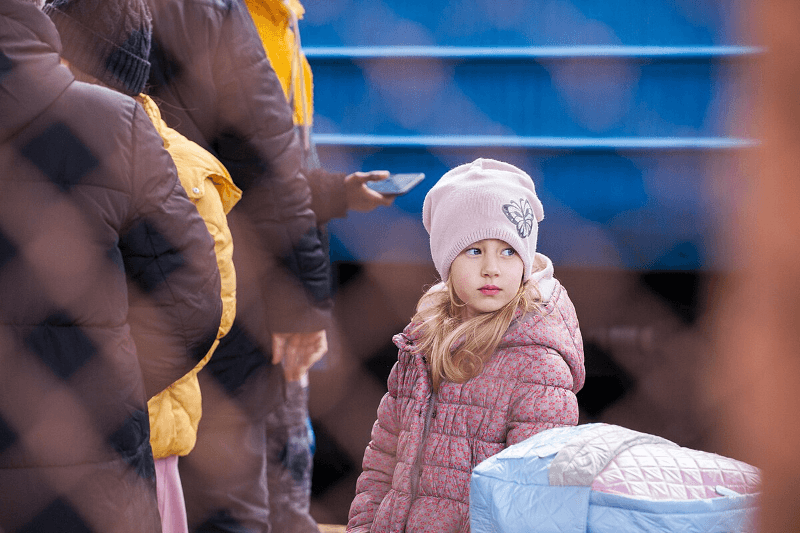Attacking Qatar on Thursday in a Montreal-based conference in a significant show of world solidarity, South Africa and the Vatican promised to arbitrate the return of about 20,000 Ukrainian children reportedly displaced to Russia since the outbreak of hostilities in February 2022. Attended by delegates from seventy countries, this high-stakes “Ministerial Conference on the Human Dimension of Ukraine’s Peace Formula,” underlined a shared commitment to solve the humanitarian issue facing Ukraine’s younger population.
Underlining the imperative of guaranteeing the safe repatriation of children, civilians, and POWs, Canadian Foreign Minister Mélanie Joly led the activities of the conference She reiterated the conference’s consistent stance on honoring humanitarian law and defending fundamental rights and then offered a historic agreement outlining sensible steps to allow their return. Emphasizing the need for a coordinated effort to help displaced persons return to Ukraine, Jolly said, “Children, citizens, and prisoners of war must be allowed to return home.”
An international mediate network with transit hubs
Under this scheme, Qatar, South Africa, and the Vatican have promised to be objective middlemen assisting with negotiations with Russia and with child repatriation logistics. Charged with facilitating communication between Russian and Ukrainian officials, these middlemen are said to be rather crucial in guaranteeing the children’s safe passage. Moreover, Qatar and Lithuania have provided their land to keep an eye on and regulate the children’s route of travel, thereby functioning as transit hubs.
Building on its recent experience allowing humanitarian exchanges, the United Arab Emirates (UAE) has also shown its readiness to arbitrate trading of Russian and Ukrainian prisoners of war. This is in keeping with UAE’s ongoing diplomatic campaigns to support humanitarian operations in crisis-torn regions and facilitate communication.
From Ukrainian perspective: optimistic forward movements
Following the event, Ukrainian Foreign Minister Andrii Sybiha voiced hope based on his satisfaction with the outcomes and the network of committed partners established up to speed the repatriation process. “I am happy to be going back to Kyiv with specific outcomes which many Ukrainian families are waiting for,” Sybiha remarked. He stressed the importance of this worldwide project given the limitations of international humanitarian law in providing total protection for people harmed by the war.
“Such combined efforts and leadership at this conference show that we could achieve results,” says Sybiha. He acknowledged that while international humanitarian law does not offer total protection in situations of conflict, international collaboration could help to boost efforts to halt more displacement and speed repatriations.
Qatar’s Contribution to Child Repatriation
Since July 2023, Qatar has been closely involved in negotiations to ensure the repatriation of Ukrainian children relocated to Russia or seized areas following the invasion. Through its diplomatic network and objective approach, it has been able to create safe paths for hundreds of Ukrainian children, providing a model for other nations to join in such humanitarian talks.
Since Qatar’s involvement demonstrates its proactive and successful middleman performance, both Ukrainian officials and the world community have commended Qatar. This recent agreement shows Qatar’s growing contributions, which show a whole attitude to address humanitarian issues inside conflict.
Global Responsibility: Demand Constant Efforts and Accountability
The severity of the subject was underlined even further in March 2023 when the International Criminal Court (ICC) issued an arrest warrant for Russian President Vladimir Putin and his Commissioner for Children’s Rights, Maria Lvova-Belova, claiming illegal deportation of Ukrainian children. Notwithstanding this, Russian authorities have routinely denied the allegations, arguing that the children were evacuated for their own safety and underlining their readiness to have the youngsters returned should family in Ukraine come forward to claim them.
The most recent conference agreement also acknowledges the challenge of matching displaced children with their family back in Ukraine. The demand of Kyiv for the return of almost 20,000 Ukrainian children highlights the extent of the issue; some experts think this figure could simply be a fraction of the actual count. This world cooperation gives many Ukrainian families hope in search of their loved ones among displaced persons and ongoing violence.
The pledges taken at this conference show a coordinated, diversified approach to humanitarian issues emanating from the fighting in Ukraine. Involving countries such South Africa, the Vatican, and Qatar as neutral mediators and establishing transit hubs in Qatar and Lithuania, the world community is laying the groundwork for a simple and compassionate repatriation process.
This agreement is a powerful example of what international diplomacy can achieve under tough conditions as well as a means of guaranteeing the protection of displaced Ukrainian children. As cooperative, diplomatic momentum continues to grow, the world becomes one step closer to reuniting families broken apart by war, thus proving the universal right of children to be safe, protected, and, at last, home.


















